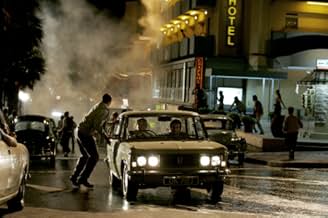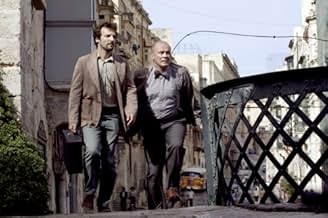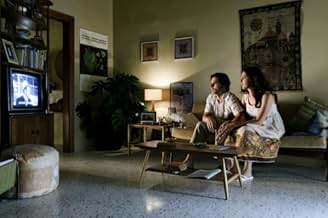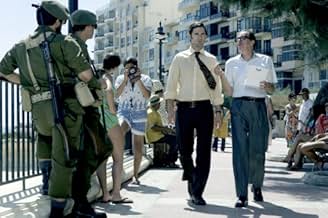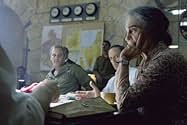Basada en los acontecimientos reales de Septiembre Negro, sobre los 5 hombres escogidos para eliminar a los responsables de aquel fatídico día.Basada en los acontecimientos reales de Septiembre Negro, sobre los 5 hombres escogidos para eliminar a los responsables de aquel fatídico día.Basada en los acontecimientos reales de Septiembre Negro, sobre los 5 hombres escogidos para eliminar a los responsables de aquel fatídico día.
- Dirección
- Guionistas
- Elenco
- Nominado a 5 premios Óscar
- 14 premios ganados y 75 nominaciones en total
Marie-Josée Croze
- Jeanette the Dutch Assassin
- (as Marie-Josee Croze)
Valeria Bruni Tedeschi
- Sylvie
- (as Valéria Bruni Tedeschi)
Amos Lavi
- General Yariv
- (as Amos Lavie)
- Dirección
- Guionistas
- Todo el elenco y el equipo
- Producción, taquilla y más en IMDbPro
Opiniones destacadas
7e-20
Munich is a well crafted film by the biggest director on the planet. Great pacing, suspense and cinematography. The biggest problem I had with the film is that I've seen it before. A little known film called THE SWORD OF GIDEON. Munich is almost a direct copy from the original. What a shame that Spielberg has to produce a remake of a much better film. Enough already with the remakes. People want to see original stories with fresh new ideas and writers. Why are independent films so successful, because the ones that are well made and tell a good story are box office darlings. It's amazing some Hollywood films have budgets north of 100 million. Just incredible how much money and time is wasted. If you want to understand what happened in the aftermath of Munich, rent THE SWORD OF GIDDEON.
Steven Spielberg has absolutely everything at his disposal, he can make an epic in no time at all. But, even he must know that films, most films have a soul and that can't be rushed. Why the need to rush this film into screens? For Oscar consideration? If there was a film that needed nurturing and thought was this one. The length is a flaw in itself. It makes it appear self indulgent and, quite frankly,annoying. If one could, and one should, put that aside, "Munich" is a remarkable experience. Tony Kushner and Eric Roth deal with people in all its complexity - a welcome new detail in a Spielberg film - and that gives "Munich" its most powerful aspect. Eric Bana is extraordinary and the humanity of his gaze is confusing and recognizable at the same time. His crying at hearing his child's voice over the phone is as real as his hardness when he massacres his targets. The controversy raising after the first public screenings seems pre-fabricated by a marketing machine. The questioning of Bana's character and the appalling nature of revenge can't be controversial it's at the base of human nature. To call Spielberg "no friend of Israel" is as absurd as it is suspicious. No, this movie is a thriller, based on actual events, directed by the greatest craftsman of the last 30 years in a record amount of time. Go see it.
Just because this film has been attacked by pols and shills, here's my 2 cents. Spielberg manages to set the agenda, and sets it correctly. It is indeed about the antecedents to 9/11, and bravo to Spielberg for taking it on, but not somewhere in Afghanistan, but at its genesis, the squalor of Palestine.
Spielberg's film is an essay on revenge and how hopeless and self-defeating that ancient temptation is. It's brave of Spielberg to say it to us now; brave, too, to paint the avenging Israelis as somewhere below the Angels. Let's be candid: There are harsh sentiments expressed here, by some Israeli characters, that the Evangelical Lobby simply doesn't want aired.
Spielberg's handling of the Bana character is masterful. Noteworthy is how uncompromising it is: this is a man whose identity has collapsed. It's entirely right that his Israeli handler should refuse the Sabbath-meal invitation at the end, realizing that the bonds of the older religion (and pre-Zionist identity) are shattered and meaningless.
Spielberg might have improved this product (some of the dialogues are horribly wooden). But that's not important. That a mainstream US film should go where this film goes is significant. This is a major-minor event in Spielberg's long and luminous career.
Spielberg's film is an essay on revenge and how hopeless and self-defeating that ancient temptation is. It's brave of Spielberg to say it to us now; brave, too, to paint the avenging Israelis as somewhere below the Angels. Let's be candid: There are harsh sentiments expressed here, by some Israeli characters, that the Evangelical Lobby simply doesn't want aired.
Spielberg's handling of the Bana character is masterful. Noteworthy is how uncompromising it is: this is a man whose identity has collapsed. It's entirely right that his Israeli handler should refuse the Sabbath-meal invitation at the end, realizing that the bonds of the older religion (and pre-Zionist identity) are shattered and meaningless.
Spielberg might have improved this product (some of the dialogues are horribly wooden). But that's not important. That a mainstream US film should go where this film goes is significant. This is a major-minor event in Spielberg's long and luminous career.
Another dip in the Spielberg pool and I come away drenched in emotion. I was a freshman in high school in Texas during the Munich games. I was stunned by the events and understood little.
Today, I am still stunned by Munich and every terrorist act that followed, but I understand so much more and grieve. Spielberg gives us a powerful glimpse into the meaning of home, family, honor, history, ethics, and faith. The movie is not about the Jews and Arabs. It's about human beings. It's about us.
The narrative is driven by our connection to Avner. We watch as Eric Bana opens himself up in a way that the likes of a George Clooney in Syriana only dreams of.
This is a must see.
Today, I am still stunned by Munich and every terrorist act that followed, but I understand so much more and grieve. Spielberg gives us a powerful glimpse into the meaning of home, family, honor, history, ethics, and faith. The movie is not about the Jews and Arabs. It's about human beings. It's about us.
The narrative is driven by our connection to Avner. We watch as Eric Bana opens himself up in a way that the likes of a George Clooney in Syriana only dreams of.
This is a must see.
10mlg-2
I am not a big Spielberg fan, and find he often goes for cheap emotional manipulation in his films, especially his endings. I was there fore amazed at the unflinching control he exercised in Munich, his utter unwillingness to flinch at complexities, his ability to dissect the ideological and moral sureties of all sides within the natural rhythms of the thriller genre. There is so much to praise in this film, because it is utterly seamless film-making with a keen eye for every little detail that never reveals the intense precision behind its construction.
While some have found the film "disengaged," I found that it pulled at the viewer's conscience through the central characters, not only Bana's Israeli agent Avner and his cohorts, most of who slowly find themselves gnawed by doubts of their mission's morality and effectiveness, but also smaller characters as well, drawn with indelible deftnessthe weary ex-French Resistance fighter now a trader in deadly information to stateless agents because of his cynicism about recurrent corrupt regimes replacing each other, or the PLO operative who debates Palestinian strategy and justification with Avner, who he wrongly believes to be a German left-wing terrorist who is "soft" on Jews because of the Holocaust. The economy of Spielberg's film-making is breathtaking in hindsight, so that what at first seems a relatively flat and emotionless exercise in historical recreation slowly seeps into one's subconscious and then moves upward, in quick bursts of sudden bursts of emotional and intellectual recognition by the viewer. These are real human beings, these are fighters in a war they believe in desperately and whose people have suffered terribly yet can find no real peace.
For this Kushner and Roth's screenplay must get much credit, the crisp narrative development intertwined with intellectually rigorous set pieces and flat-out armrest-clutching actions sequences. John Williams, who has managed to be understated in the past, is equally adept at building (or feinting) tension and subtly commenting on character development. Check out the slightly dissonant piano in the last scene to see what I mean. Longtime Spielberg collaborator Janusz Kaminski creates some amazing framing devices, especially as the action sequences are about to unfold and during moments of intimate conversations imbued with tension. Michael Kahn's editing is crisp and occasionally startling, as in the way the conclusion of the horrifically bungled Munich "rescue" is related. The retelling of the entire event from break-in to conclusion is doled out in bits and pieces in what seems at first an attempt to soften its impact but in the end, entwined as it is with all of the complicated issues, is finally revealed as a masterful means of achieving the fully deserved emotional impact within a complexly rendered ideological, moral and strategic matrix. There is not a false note in any of the acting, and the casting is uniformly spot-on.
About the politics. The radicals on either side will reject the film out of hand because it dares to render both sides as human and worthy of understanding. But attempting to understand choices of violence and vengeance as strategies does not in any way mean condoning them. Certainly, anyone who feels that the film somehow allows a viewer to walk away thinking that Black September was justified in its attack is probably projecting his or her fears about how some imagined uninformed viewer might react. Instead, the film demonstrates that whether one feels either or both sides justified it doesn't mannerneither side can win through violence at this point. This was Yitzhak Rabin's great insightyou don't make peace with your friends, you make peace with your enemies. His Israeli Jewish murderers wanted violence to continue, believing that only a continued state of war would keep Israel from giving back land they saw as bound up with their faith but which international law, historical study and the basic "facts on the ground" reveal to be bound to be returned to the Palestinians. Ariel Sharon, of all people, came to understand this, though without the larger vision and magnanimity of spirit that his fellow warrior Rabin discovered. Spielberg's message is clearthe extremists will choose war over peace, but must so many of us side with the extremists because of our fear of appearing weak or "giving in"? A last note on politicsthere is clear relevance to the United States' current predicament post-9/11. One can almost here Cheney or Bush making the speech made by Israeli premier Golda Meir in the film (an extraordinary piece of recreation that transcends mere imitation), only probably with more moral surety and less sense of resignation. Anyone paying attention to world reaction to Guantanimo, Abu Gharib, the bombing of Afghan and Iraqi villages and the spiriting away of suspected terrorists through "rendition" for torture in "friendly" nations must be aware that whether one leans hard or soft on such matters, there is going to be a price to be paid. The hardliners believe we will just keep punching and slugging and eventually the bad guys will go down; that they will not reproduce themselves like the many-headed Hydra or germinate and reproduce by the thousands in the fetid waters of our perceived hypocrisywhether you think it justified or not it doesn't matter. As Spielberg makes clear in this film, all that matters in the end is peace or violence, and whoever ultimately desires the former had better be damn sure that their use of the latter is measured by the awareness that it use will create debts that will need to be repaid in the end, and the debtors will most likely be the generations to come on all sides.
While some have found the film "disengaged," I found that it pulled at the viewer's conscience through the central characters, not only Bana's Israeli agent Avner and his cohorts, most of who slowly find themselves gnawed by doubts of their mission's morality and effectiveness, but also smaller characters as well, drawn with indelible deftnessthe weary ex-French Resistance fighter now a trader in deadly information to stateless agents because of his cynicism about recurrent corrupt regimes replacing each other, or the PLO operative who debates Palestinian strategy and justification with Avner, who he wrongly believes to be a German left-wing terrorist who is "soft" on Jews because of the Holocaust. The economy of Spielberg's film-making is breathtaking in hindsight, so that what at first seems a relatively flat and emotionless exercise in historical recreation slowly seeps into one's subconscious and then moves upward, in quick bursts of sudden bursts of emotional and intellectual recognition by the viewer. These are real human beings, these are fighters in a war they believe in desperately and whose people have suffered terribly yet can find no real peace.
For this Kushner and Roth's screenplay must get much credit, the crisp narrative development intertwined with intellectually rigorous set pieces and flat-out armrest-clutching actions sequences. John Williams, who has managed to be understated in the past, is equally adept at building (or feinting) tension and subtly commenting on character development. Check out the slightly dissonant piano in the last scene to see what I mean. Longtime Spielberg collaborator Janusz Kaminski creates some amazing framing devices, especially as the action sequences are about to unfold and during moments of intimate conversations imbued with tension. Michael Kahn's editing is crisp and occasionally startling, as in the way the conclusion of the horrifically bungled Munich "rescue" is related. The retelling of the entire event from break-in to conclusion is doled out in bits and pieces in what seems at first an attempt to soften its impact but in the end, entwined as it is with all of the complicated issues, is finally revealed as a masterful means of achieving the fully deserved emotional impact within a complexly rendered ideological, moral and strategic matrix. There is not a false note in any of the acting, and the casting is uniformly spot-on.
About the politics. The radicals on either side will reject the film out of hand because it dares to render both sides as human and worthy of understanding. But attempting to understand choices of violence and vengeance as strategies does not in any way mean condoning them. Certainly, anyone who feels that the film somehow allows a viewer to walk away thinking that Black September was justified in its attack is probably projecting his or her fears about how some imagined uninformed viewer might react. Instead, the film demonstrates that whether one feels either or both sides justified it doesn't mannerneither side can win through violence at this point. This was Yitzhak Rabin's great insightyou don't make peace with your friends, you make peace with your enemies. His Israeli Jewish murderers wanted violence to continue, believing that only a continued state of war would keep Israel from giving back land they saw as bound up with their faith but which international law, historical study and the basic "facts on the ground" reveal to be bound to be returned to the Palestinians. Ariel Sharon, of all people, came to understand this, though without the larger vision and magnanimity of spirit that his fellow warrior Rabin discovered. Spielberg's message is clearthe extremists will choose war over peace, but must so many of us side with the extremists because of our fear of appearing weak or "giving in"? A last note on politicsthere is clear relevance to the United States' current predicament post-9/11. One can almost here Cheney or Bush making the speech made by Israeli premier Golda Meir in the film (an extraordinary piece of recreation that transcends mere imitation), only probably with more moral surety and less sense of resignation. Anyone paying attention to world reaction to Guantanimo, Abu Gharib, the bombing of Afghan and Iraqi villages and the spiriting away of suspected terrorists through "rendition" for torture in "friendly" nations must be aware that whether one leans hard or soft on such matters, there is going to be a price to be paid. The hardliners believe we will just keep punching and slugging and eventually the bad guys will go down; that they will not reproduce themselves like the many-headed Hydra or germinate and reproduce by the thousands in the fetid waters of our perceived hypocrisywhether you think it justified or not it doesn't matter. As Spielberg makes clear in this film, all that matters in the end is peace or violence, and whoever ultimately desires the former had better be damn sure that their use of the latter is measured by the awareness that it use will create debts that will need to be repaid in the end, and the debtors will most likely be the generations to come on all sides.
¿Sabías que…?
- TriviaGuri Weinberg played his own father. He is the son of Moshe Weinberg, the Israeli wrestling referee and former champion, who died in the massacre when Guri was just one month old.
- ErroresThough they took the time to digitally add the World Trade Center to the final shot, they didn't edit out the Citigroup Center, Trump World Tower, and the Bloomberg building, which were built after the time of the movie.
- Versiones alternativasThe film was heavily censored in Malaysia for a 'U' rating. The uncut version is rated '18PL'.
- ConexionesFeatured in Today: Episode dated 27 July 2005 (2005)
- Bandas sonorasAin't No Sunshine
Written & Performed by Bill Withers
Courtesy of Columbia Reecords
By Arrangement with Sony BMG Music Entertainment
Selecciones populares
Inicia sesión para calificar y agrega a la lista de videos para obtener recomendaciones personalizadas
Detalles
- Fecha de lanzamiento
- Países de origen
- Idiomas
- También se conoce como
- Untitled 1972 Munich Olympics Project
- Locaciones de filmación
- Bugibba, Malta(Olympic Hotel in Cyprus)
- Productoras
- Ver más créditos de la compañía en IMDbPro
Taquilla
- Presupuesto
- USD 70,000,000 (estimado)
- Total en EE. UU. y Canadá
- USD 47,403,685
- Fin de semana de estreno en EE. UU. y Canadá
- USD 4,152,260
- 25 dic 2005
- Total a nivel mundial
- USD 130,982,407
- Tiempo de ejecución
- 2h 44min(164 min)
- Color
- Mezcla de sonido
- Relación de aspecto
- 2.35 : 1
Contribuir a esta página
Sugiere una edición o agrega el contenido que falta


